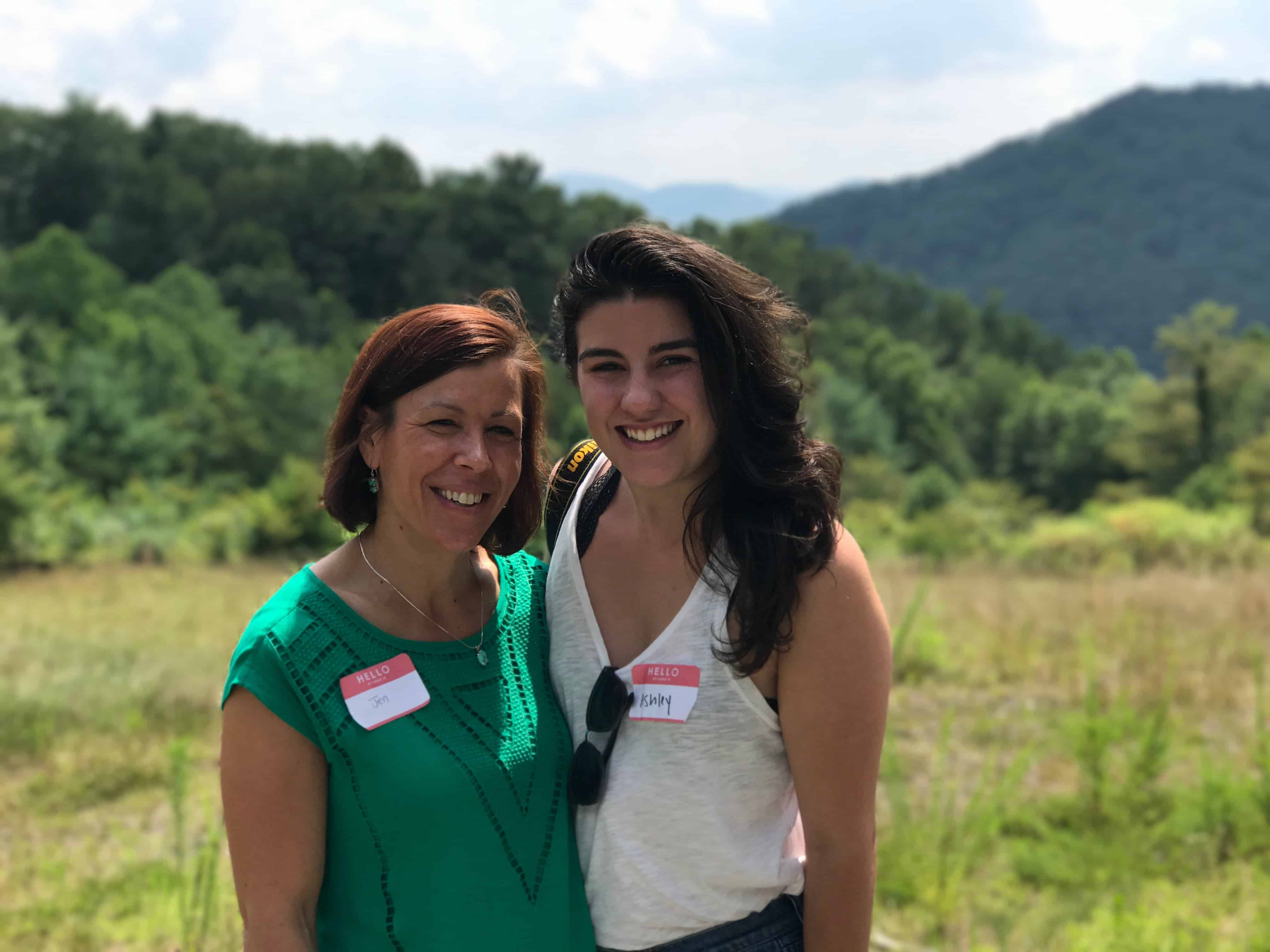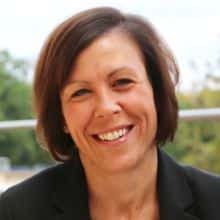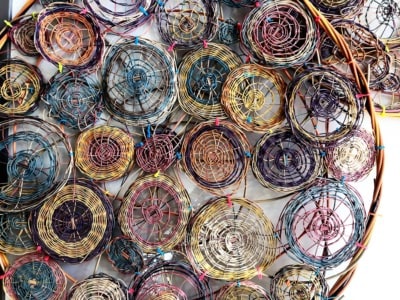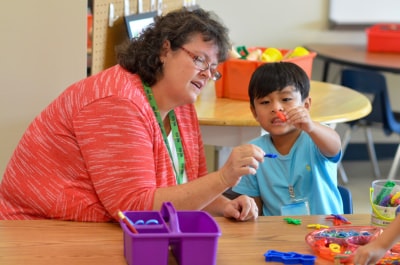My family was a group of New York Jews, transplanted to the mountains of North Carolina in the 1970s for my dad to teach at Appalachian State University. Now, if you don’t know what a holler is, it’s technically a ravine between mountains. But what it really is, is a place no one can find. And often, no one wants to. It’s geographic isolation, and social isolation too, especially when you are the only Yankee Jews in the region. It’s a place where the resources aren’t there. And you just have to figure things out.
As a kid, one of the things I had to figure out was how to keep myself occupied. And ever since I could remember, I had an obsessive fascination with strength. The Six Million Dollar Man was my hero. I thought being physically strong was the secret to everything.
One of the things I used to do, when I was about three years old, was sneak into the dining room when my parents were eating dinner or having friends over. I would crawl under the table, then slide on my back under some adult’s seat, and leg press them up in the air. It was one of my favorite activities. It was NOT one of my parent’s favorite activities of mine.
What was important to me was that it proved I was strong. When I was four, we went back to my father’s synagogue in New York (there were no synagogues anywhere near us), and I went through the Jewish tradition of getting a Hebrew name. The Hebrew name they gave me was Gavriela. Which translates to “G-d is my strength.” I was so proud to have been given a name focused on strength. But at the time, I had no idea what strength really meant.
We left the holler in the late 70s and came to the Triangle. My elementary school years were pretty simple and reinforced my belief that if I was physically strong, which was all I needed. I was the fastest runner in my neighborhood, the fastest swimmer. I could climb, I could throw, I could wrestle. I thought…I have it all.
When I started middle school, things rapidly began to change. At that time, my school system was trying all kinds of strategies to diversify the schools — by race and by socioeconomic status. My family was not poor, but for our area, we were lower income, so I got sent to a school where I was by far the poorest kid there. And, even compared to growing up in a mountain holler, I had never felt such isolation.
The bullying started immediately — not physical, but emotional. I could not figure out how they knew so quickly that I was not one of them, but they did. And they made sure I knew it. I sat alone in classrooms. I sat alone at lunch. I sat alone on the bus. Girls would whisper to me, “Everyone here hates you.” And the strength I thought I had, the strength I had always valued and treasured, was of no use to me. I couldn’t run away. I couldn’t fight. I couldn’t combat what was happening to me. And as a result, I started to turn dark, and cold, and a hate began to grow in me. It burned. And I saw these people as evil. As my tormentors. And I wanted to rage against them. Let them know how much they hurt me, by hurting them. Then my strength would be of value.
By the grace of G-d, when these feelings of hate where hitting their peak, I was saved from myself by a teacher, who changed my life.
She passed away a few years ago, but her story redefined strength for me.
She was tiny. Maybe 4 feet ten inches at most. But her short stature belied her enormous personality. She had a booming voice. She ruled our school with the most strict love I have ever known. In seventh grade, when I was building a wall of hate around me, she shared with us her story.
She was born in Poland in the mid 1920s. She lived in a small village with her mother, father, and brother. She loved to read and loved school. Her family was poor as it related to money, yet wealthy as it related to love, relationship, and friendship. But all too soon her young life drastically changed.
Eight days after her thirteenth birthday, the Nazi army invaded Poland. The Polish army was quickly defeated and in her village, they heard tale of Jews being rounded up and forced into ghettos. But it sounded so impossible. Her father held them close at night and told them they would be ok, that they just had to endure a few weeks, and all would return to normal.
But nothing would ever be normal again.
Within those few weeks, their village was raided. All the Jews were pulled out of their homes. She witnessed her friends, teachers, rabbis, lined up in the village square, then gunned down, as if they were cuts of meat instead of human beings.
She was 13.
Comparatively, her family was lucky. They were herded into the Warsaw ghetto with thousands of other families. In the ghetto, they lived in a single family apartment with five other families: 23 people living in two rooms. Each day, the Gestapo would walk through the ghetto, pulling out the sick, the weak, but also the leaders of this new community, lining them up, and gunning them down.
Death was the new way of life. It was everywhere. There was not enough food. People began to starve. There was no medicine. A cold could be lethal. There was no oil for heat. Winter came. People began to freeze to death.
She was young. She was blonde, and she had blue eyes. More importantly, she was a good learner. She began learning German, Russian, and Hungarian, and every other language in the ghetto. She had to make herself valuable. She said she knew that while the Nazis valued no life in that ghetto, they still needed things, and if she could be of value, then maybe she could get out, get food, smuggle in clothes or medicine, find a way to save some lives. After all, she thought it could not get worse.
And for a short time, the fact that she did not look like a Jew, the fact that she could speak German, worked. She would get outside the ghetto. She found ways to find food. She was keeping 22 other people in her small apartment alive.
She had just turned 14.
For three years she survived life in the Warsaw ghetto. In 1942, a massive deportation of 60,000 Jews took place from the ghetto. Families pulled again from their homes.
She was 16 years old.
She remembered her mother crying, and her father trying to comfort her. Her younger brother, only ten, thought they were going home. In the chaos of bodies, her father whispered to her: “Get out. Hide. Get away.” She couldn’t believe what he was saying. She could not leave them. But as they were herded towards the platforms, he pushed her away. She fell under the cattle car, saw her mother, father, and brother pushed in, and never saw them again.
For months she lived in the woods surrounding Warsaw. She would steal food from farms. Hide in barns. There was nowhere to go. She lived outside, and alone, for nearly six months before a farmer found her in his barn, held her at gunpoint, and turned her in to the Gestapo.
It was 1943. She had seen hundreds of people die. Even with that, it did not prepare her for what awaited. She was loaded on a cattle car — the same type where she had last seen her family. The car stunk of bodies and human waste. She was packed in with what seemed like hundreds of other women. Young and old. There was no room to sit down. There was only one small window for fresh air. The train traveled all day and night. No food, no water, no place to use the bathroom. When they arrived at Treblinka, a death camp, she walked out of the cattle car, stepping over bodies as she exited.
She was 17.
For two years, she worked to survive each day. Her love of learning enabled her to quickly learn more languages. She was given jobs to help translate foreign army messages. She was fed one bowl of watery soup each day. Sometimes with a piece of rotten potato in it but more often not. She was starving to death. She endured marches in snow and in the freezing cold. She lived in bunks infested with lice and disease. Each morning, as they stood for count, she would witness at least one human being shot, or beat to death, or dragged away to the showers. Death was everywhere. Hate was everywhere.
This was her every day. For two years.
As the tide of the war turned, the killing in the camp increased. The more fearful the Germans became of defeat, the more people were killed in her camp. On what she thought would be the last morning of her life, she was marched with a group to the woods outside Treblinka. She was handed a shovel and told to dig. They were all told to dig. The soldiers were screaming at them to dig faster, faster. She was digging furiously when a rabbi standing beside her touched her arm and said:
“Child, slow down. You have all the time in the world to die.”
The next thing she knew, American tanks were cresting over a hill. She passed out. And remembers nothing until waking up in a hospital in America.
She was 19.
She had family in New York. She does not know how she got there. She weighed 40 pounds. She remembers being in the hospital for a long time, but not much else.
What she does remember, however, and what changed my life, was one of her first experiences out of the hospital, walking down a street in New York, and hearing two men speaking German in front of her. Her initial reaction was rage. She wanted to kill them. She thought of her mother, her father, her brother, the hundreds of people she had seen killed before her eyes. The millions more that had been exterminated. Simply because they were Jews.
The hate was blinding.
But then she stopped.
She said at that moment G-d spoke to her. She heard him say that if she hated people for being German, then she had learned nothing, and the Nazis had won. For hating them would be the exact same thing that was done to her, and her family, and millions of other people.
And she stopped. And in that moment, she dedicated her life to teaching.
Teaching about love.
Teaching about connection.
Teaching about humanity.
Teaching about the divine spark that is in each and every one of us.
I could not believe the change she could make. For all her suffering, she chose to help the world, not carry on the hate.
I realized how easy it was to hate. To define people by age, race, religion. To think of people as others because they had more money, lived in a different neighborhood, went to a different school.
There is so much to divide us.
But she showed me real strength.
Strength in resilience.
Strength in learning.
Strength in finding what connects us as human beings.
Strength that comes from finding the divine.
We are all different. No two people — not close family members, not even identical twins — are exactly alike.
But what we all have is the ability to find real strength. And that is the strength to see the divine in everyone. The strength to take the hurt, and the anger, and the pain, and to turn it into connection, and learning, and outreach.
Victor Frankl, another Holocaust survivor, captures the essence of real strength in his powerful memoir Man’s Search for Meaning. He says:
“When we are no longer able to change a situation we are challenged to change ourselves. Everything can be taken from a man but one thing — the last of human freedoms — to choose one’s attitude in any given set of circumstances, to choose one’s own way.”
I choose to honor her and to choose the path of finding the divine in everyone. We are connected. I choose to honor the lives lost by lives that can be made whole. I choose to honor my Hebrew name. G-d is my strength.





